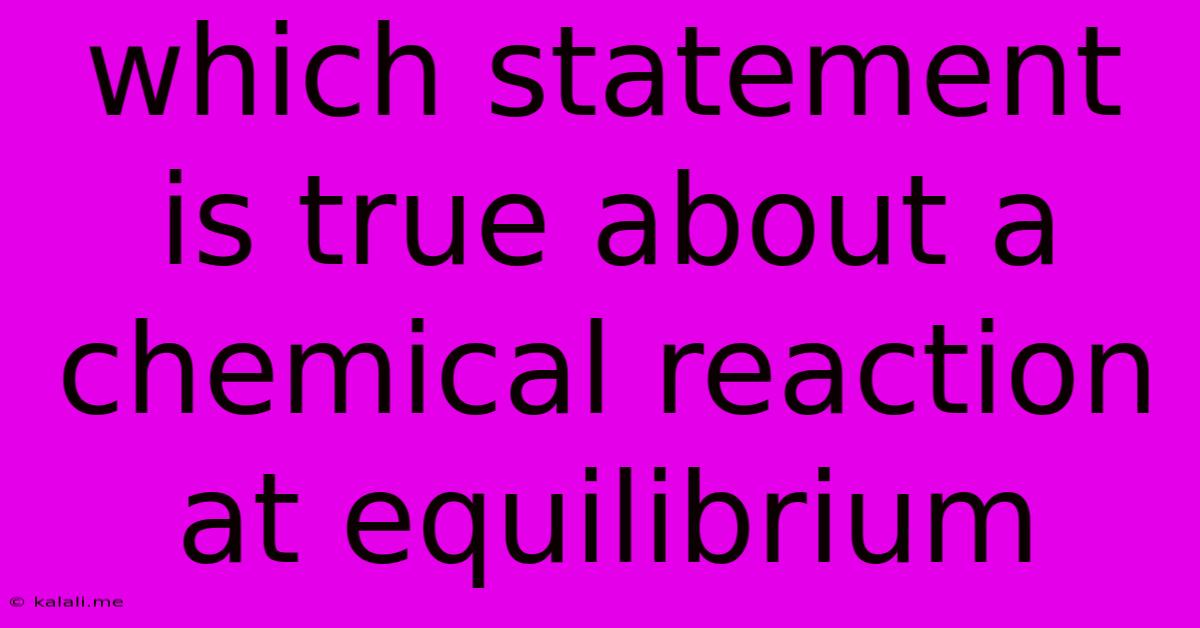Which Statement Is True About A Chemical Reaction At Equilibrium
Kalali
Jun 11, 2025 · 3 min read

Table of Contents
Which Statement is True About a Chemical Reaction at Equilibrium?
Meta Description: Understanding chemical equilibrium is crucial in chemistry. This article explores the characteristics of a reaction at equilibrium, clarifying common misconceptions and highlighting the true statement regarding the rates of forward and reverse reactions.
Chemical equilibrium is a dynamic state where the rates of the forward and reverse reactions are equal, resulting in no net change in the concentrations of reactants and products. Many students struggle to grasp the nuances of this concept. Let's delve into the key characteristics and dispel some common misunderstandings surrounding chemical equilibrium. This article will ultimately answer the question: which statement is true about a chemical reaction at equilibrium?
Understanding Chemical Equilibrium: A Dynamic Balance
A chemical reaction doesn't simply stop when it reaches equilibrium. Instead, it's a continuous process where the forward reaction (reactants forming products) and the reverse reaction (products reforming reactants) occur at the same rate. This means that while the net change in concentrations is zero, individual molecules are still reacting. Think of it like a busy highway with equal amounts of traffic flowing in both directions – the overall number of cars at any given point remains relatively constant.
Common Misconceptions About Equilibrium
Before we identify the true statement, let's address some prevalent misconceptions:
- Equilibrium means no reactions are occurring: This is incorrect. The forward and reverse reactions are still happening at equal rates. Equilibrium is a dynamic state, not a static one.
- Equilibrium means equal concentrations of reactants and products: While this might be true in some cases, it's not a defining characteristic of equilibrium. The equilibrium concentrations depend on the equilibrium constant (K), which reflects the relative strengths of the forward and reverse reactions.
- Adding more reactants shifts the equilibrium to the right indefinitely: Adding more reactants does shift the equilibrium to favor product formation (Le Chatelier's principle). However, it doesn't proceed infinitely; it reaches a new equilibrium point with altered concentrations.
The True Statement About Chemical Equilibrium
The correct statement about a chemical reaction at equilibrium is: The rates of the forward and reverse reactions are equal. This is the fundamental definition of chemical equilibrium. While the concentrations of reactants and products might not be equal, the rates of the opposing reactions are always balanced at equilibrium.
Factors Affecting Equilibrium
Several factors can influence the position of equilibrium, including:
- Changes in concentration: Adding more reactants shifts the equilibrium towards products, and vice versa.
- Changes in temperature: The effect of temperature depends on whether the reaction is exothermic (releases heat) or endothermic (absorbs heat).
- Changes in pressure (for gaseous reactions): Increasing pressure favors the side with fewer gas molecules.
- Presence of a catalyst: A catalyst speeds up both the forward and reverse reactions equally, reaching equilibrium faster, but without affecting the equilibrium position itself.
Conclusion
Chemical equilibrium is a dynamic state characterized by equal rates of forward and reverse reactions. Understanding this fundamental principle is crucial for predicting and manipulating reaction outcomes in various chemical processes. Remember, equilibrium is not a static endpoint but rather a balanced, continuous interplay between reactants and products.
Latest Posts
Latest Posts
-
Do The Contestants On Naked And Afraid Get Paid
Jul 01, 2025
-
How Many Yards Are In 7 Feet
Jul 01, 2025
-
What Is Shortest Book In The Bible
Jul 01, 2025
-
How Many Cups Of Orzo In A Pound
Jul 01, 2025
-
How Long Does It Take To Drive 30 Miles
Jul 01, 2025
Related Post
Thank you for visiting our website which covers about Which Statement Is True About A Chemical Reaction At Equilibrium . We hope the information provided has been useful to you. Feel free to contact us if you have any questions or need further assistance. See you next time and don't miss to bookmark.